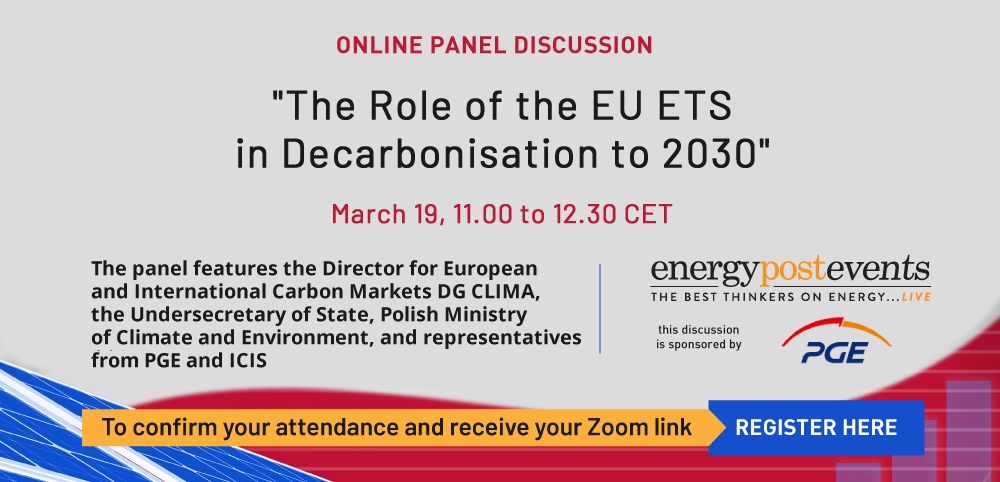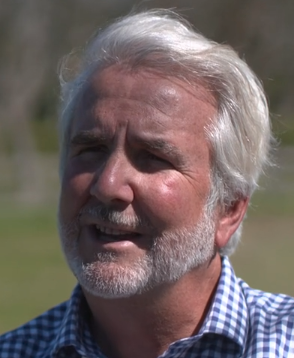
"The Role of the EU ETS in Decarbonisation to 2030"
The higher target for 2030 will pose a tremendous challenge for sectors covered by the EU ETS (e.g. power and heat, energy-intensive industries). They are expected to carry the heaviest investment burden to implement the higher climate ambition set to be at least 55% for 2030.
According to the European Commission’s Impact Assessment the 55% target could mean reductions of as much as 65% in the EU ETS sectors until 2030. This means, first and foremost, that ensuring fair burden sharing between ETS and non-ETS sectors will be the key to success.
Ensuring cost-effectiveness will still be important, but it will have to be considered in conjunction with ensuring competitiveness, a just transition, and fair distribution of decarbonisation costs. These issues will be even more important for citizens and Member States now, compared to the previous ETS Reform, as Europe grapples with the economic consequences of COVID-19.
The EU’s plan is to boost economic growth through green investments but should the main investment burden still be on the ETS sectors or should all sectors contribute an equal share to the implementation of the new climate targets?
All political aspects will require careful examination and technical expertise. Market participants, who can provide valuable insights based on their experience, can also provide useful input into the political debate as to how the EU ETS should be redesigned in order to help the EU implement its targets better.
The EU should account for sectoral differences but at the same time it should look at different starting points within sectors. For example, if the EU decides that the target should be predominantly implemented by the EU ETS sectors then the energy sector is likely to carry the heaviest investment burden as the marginal costs of abatement in that sector are the lowest.
However, this does not take into account different starting points between Member States in their energy mix and the knock-on effect that higher electricity prices can have for the international competitiveness of European industry.
At the same time missteps in the extension of the EU ETS to new sectors can exacerbate this problem. How do we get the EU ETS right whilst ensuring competitiveness, fair distribution of costs and just transition?
Participants will focus in their discussion on the following questions:
- How to design the EU ETS and non-ETS framework to ensure that all sectors will contribute to the implementation of the new climate targets?;
- What should be the fair share of emissions reduction of ETS and current non-ETS sectors?;
- How the forthcoming EU ETS revision already impacts the EU carbon market?;
- How to facilitate just and energy transition through EU ETS-based instruments?;
- How to divide EU ETS allowances between sectors and member states?;
- What should be the direction of the MSR review, especially in the possible extended EU ETS?;
- Should the EU establish different trading schemes for sectors with different marginal abatement costs?
- How do carbon market players prepare for the next legislative package?
The PANEL:
- Adam Guibourge-Czetwertyński, Undersecretary of State, Polish Ministry of Climate and Environment
- Beatriz Yordi, Director for European and International Carbon Markets, DG CLIMA
- Wanda Buk, Vice-President of PGE for Regulatory Affairs (event sponsor)
- Dirk Forrister, President and CEO, International Emissions Trading Association
- Philipp Ruf, Director for Energy Analytics, ICIS
REGISTER
PROGRAMME & PANELLISTS

Adam Guibourgé-Czetwertyński,
Deputy Climate Minister, POLAND
Graduate of HEC Paris and the history faculties of the Paris IV-Sorbonne University and the University of Warsaw.
In 2013, he began working at the Ministry of Environment as part of the Climate Negotiators Team at the United Nations COP19 Climate Summit in Warsaw. Previously, he had gained experience in the field of finance in the private sector.
In 2015–2018, he headed the Environmental Department at the Permanent Representation of the Republic of Poland to the European Union in Brussels, where he negotiated draft legislation on the environment and climate in Council working groups. In 2018, he served as the chief negotiator of the Polish Presidency of COP24 in Katowice, preparing a package of decisions implementing the Paris Agreement, the so-called Katowice Rulebook. In 2019, he once again became the head of the Environmental Department at the Permanent Representation of the Republic of Poland to the EU.

Beatriz Yordi,
Director, European and International Carbon Markets DG CLIMA
Beatriz Yordi is a Director in DG Climate Action leading the team responsible for the EU Emissions Trading System and international carbon markets, promoting carbon pricing and advancing innovation, opportunities and competitiveness in line with the Paris agreement. She specialised in fundamental physics at the University of Santiago de Compostela.

Wanda Buk
Vice-President, Regulatory Affairs, PGE S.A.
Ms. Wanda Buk holds the title of attorney, she graduated from the Faculty of Law and Administration at the University of Łódź, as well as the Faculty of French Business Law at the Université de Poitiers in France. She started doctoral studies at the War Studies Academy. Ms. Wanda Buk has held the position of Undersecretary of State at the Ministry of Digital Affairs since July 2018. She has been managing the Telecommunications Department, Legal Department, International Policy Department and the Office of the Minister. From January 2016, Wanda Buk was the director of the Digital Poland Project Centre. She managed the institution responsible for implementation of European funds earmarked for the digitisation of the country. She worked in a number of law firms, where she implemented infrastructure projects, including ones financed from public funds.

Dirk Forrister
President and CEO, International Emissions Trading Association
Dirk Forrister is President and CEO of the International Emissions Trading Association (IETA), a non-profit business association dedicated to market-based climate policies. With 140 member companies, IETA is respected globally as a thought leader on strategies to harness the power of markets to bring climate protection. Dirk brings a long history of public and private sector engagement in energy and environmental policy. He spent a decade as Managing Director at Natsource LLC, the manager of carbon funds valued at $1.2 billion. Earlier in his career, Mr. Forrister served as Chairman of the White House Climate Change Task Force in the Clinton Administration, and Assistant U.S. Secretary of Energy for Congressional and Public Affairs

Philipp Ruf
Director for Energy Analytics, ICIS
Philipp Ruf is the Director of Energy Analytics at I.C.I.S., an analytics provider for global energy and petrochemical markets. He is responsible for I.C.I.S.’s energy analytics coverage in international carbon, electricity and LNG markets. Philipp leads a team of 45 analysts globally that helps utilities, trading companies, industrials, investors and governments to navigate the transition of energy markets.

Matthew James (Moderator)
Managing Director, ENERGY POST
Working in energy communications for past 11 years, first as Managing Director of Synergy, organisers of European Utility Week, then, since 2014, at Energy Post. Energy Post is read by over 50,000 energy professionals every month. It is technology neutral, offering a platform for experts from all areas of the energy sector to share their knowledge. The Transition is at the heart of our reports.


